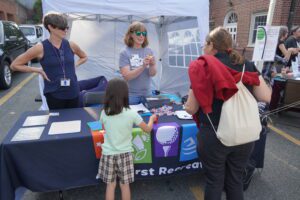Who is a member?
Our members are the local governments of Massachusetts and their elected and appointed leadership.

Amherst Aquatics Coordinator Denise Leckenby, left, and Amherst Recreation Outreach Director Becky Demling greet people at a downtown block party in Amherst on Sept. 21. Behind them is a new tent the town purchased to provide a calming space for people with sensory needs during events. (Photo courtesy town of Amherst)
Hoping to welcome more participants into its programs, the Amherst Recreation Department recently became certified for sensory inclusion after reimagining the way it serves people with various sensory needs.
In July, the Recreation Department received its sensory inclusive certification through KultureCity, an Alabama-based nonprofit that promotes inclusivity and accessibility for people with sensory needs and “invisible disabilities” around the world. Though some public entities in Massachusetts have received the certification — most notably, some public libraries and a few police departments – the town and the organization believe that Amherst is the state’s first recreation department to receive the KultureCity training.
The town’s effort to address sensory needs gained momentum after Becky Demling joined Amherst’s Recreation Department recently as outreach director. As a longtime Amherst resident, a former employee of the Amherst public schools, and a mother of an adult child with disabilities, she was aware of the sensory challenges facing local families.
“I lived in Amherst for the last 16 and a half years, and honestly, two of my kids could participate in rec programming, and one couldn’t,” Demling said. “So when I started here last year, that was something that I wanted to change for families going forward. Not that we can meet the needs of every kid, but we can certainly do better to be more inclusive and welcoming in the community.”
While the public may associate sensory issues primarily with autism, the sensory inclusive training also seeks to improve services for people with ADHD, anxiety, PTSD, trauma, dementia, the effects of strokes, and Parkinson’s disease. According to KultureCity, one in four people has a sensory processing need or invisible disability.
Amherst employees completed the training, an online program designed by medical and neurodivergent professionals, within two months. The program helped employees recognize people with sensory needs and address sensory overload situations.
“The great thing about KultureCity, and what I saw with the training, is that we’re not trying to change the people who have sensory sensitivities,” said Denise Leckenby, Amherst’s aquatics coordinator. “We’re trying to change the way we do our work in recreation, so that we have wider open doors for people.”
From June through August, Leckenby’s staff taught nearly 50 adaptive swim lessons to neurodivergent youth and people with disabilities from Amherst and surrounding communities, in addition to the nearly 1,000 traditional swim lessons.
According to Demling, 62 employees received the KultureCity training earlier this year — more than half of the department’s average 112 employees, factoring in seasonal fluctuations.
Through KultureCity, Amherst also received five sensory bags equipped with noise-canceling headphones, fidget tools, verbal cue cards and weighted lap pads to help people address their own sensory needs while participating in recreational programming. In addition, the town bought a tent, additional headphones and earplugs, and specialized seating to accommodate residents who need a quiet break during town events, in an enclosed, safe place.
Amherst also separately purchased adaptive swim equipment, such as specialty floats and life vests, and made physical improvements, including adding stairs that comply with the Americans with Disabilities Act, and a new adaptive lift for the town’s two outdoor pools, Demling said.
Overall, the town said it used about $29,000 in American Rescue Plan Act funds for the purchases, physical improvements and training.
“One of the challenges with ARPA, with grant spending, is trying to find life for the investment beyond the terms of the grant, and this fits really neatly in giving us an opportunity to have something that would be able to live and breathe beyond the life of this grant,” said Recreation Director Reynaud Harp. “This is something that, in terms of the resources, in terms of the training, certainly is an investment that eventually becomes part of our lifeblood.”